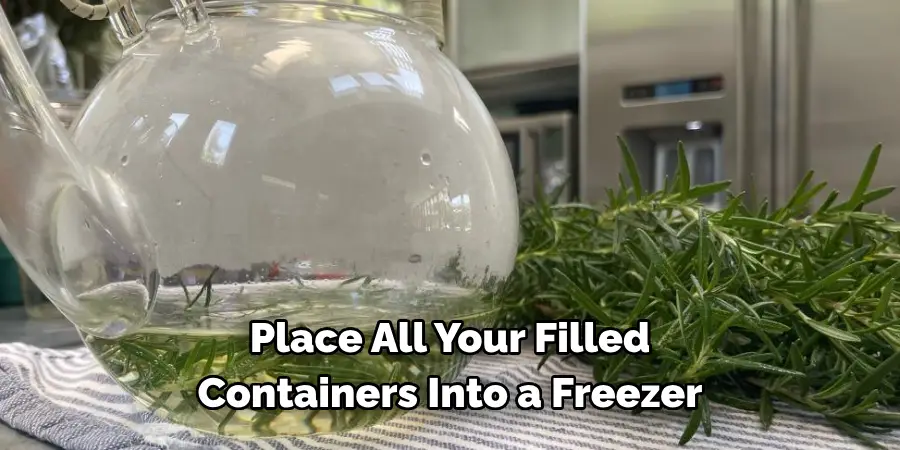Rosemary is a popular ingredient in many dishes, and rosemary water has gained popularity for its many health benefits. But what if you have too much rosemary water and can’t use it all before it spoils? Can you freeze rosemary water?
So, we decided to investigate and provide you with a comprehensive answer. In this post, we’ll explore the characteristics of Rosemary water, discuss its preservation, and, most importantly, determine if freezing is a viable option.
Whether you’re a gourmet chef, a fitness enthusiast, or simply someone who loves experimenting with natural flavors, this post is going to enlighten and inspire you. So, let’s embark on this aromatic journey together.

What is Rosemary Water?
Rosemary water is a fragrant infusion made by steeping fresh or dried rosemary leaves in boiling water. This simple process results in a flavorful concoction that carries the aromatic essence of rosemary and can be used in a myriad of ways. It’s a refreshing drink, a flavorful ingredient in soups, sauces, and cocktails, and it’s even used in beauty routines.
As for its benefits, rosemary water is believed to have a host of them. It’s rich in antioxidants and anti-inflammatory compounds, which may help reduce inflammation in the body. Some people use it topically for its potential to stimulate hair growth and soothe skin, while others drink it for its potential digestive benefits.
Can You Freeze Rosemary Water?
The short answer is yes; you can freeze rosemary water. The process of freezing rosemary water is simple. Begin by pouring the rosemary water into an ice cube tray. Freeze the tray until the rosemary water has solidified, then remove the ice cubes from the tray and place them in a freezer-safe container or bag. Label the container or bag with the freezing date and store the rosemary water in the freezer for up to six months.
Why Should You Freeze Rosemary Water?
Freezing rosemary water may seem unusual, but it can be incredibly beneficial for your health and your cooking. Rosemary is a popular herb known for its distinct flavor and numerous health benefits, including its ability to boost memory and concentration. By freezing rosemary water, you can preserve these benefits long-term, allowing you to easily add the herb to your favorite recipes whenever you want.
Additionally, freezing rosemary water can help you save time and money by allowing you to use the herb even when it’s out of season. So, if you’re looking for a simple and effective way to enhance the flavor and health benefits of your cooking, consider freezing rosemary water – your taste buds (and brain) will thank you!
Understanding Rosemary Water
A. Properties and benefits of rosemary water
Rosemary water is laden with beneficial properties that can be harnessed in various ways. From a culinary perspective to medicinal uses and even aromatherapy, this herb-infused water is a powerhouse of benefits.
- Culinary uses: Rosemary water carries a unique, aromatic flavor that can enhance a diverse range of dishes. It can be used in marinades for meats, added to soups and stews, or used as a flavoring for baked goods. Its refreshing, slightly minty taste pairs well with many flavors, offering a touch of sophistication to your culinary creations.
- Medicinal properties: Rosemary water is known to possess numerous health benefits. It is rich in antioxidants, offering potential benefits for heart health and anti-inflammatory properties. It’s also been suggested to support digestive health, boost the immune system, and potentially aid in improving mood and reducing stress.
- Aromatherapy benefits: The aromatic properties of rosemary make it a popular choice in the world of aromatherapy. Rosemary water, when used in a diffuser, can create a calming environment and promote mental clarity. Its invigorating scent is also thought to boost energy levels and uplift mood.
Considerations Before Freezing
A. Storage time
When properly stored, rosemary water can be kept in the freezer for up to six months without losing its flavor or health benefits.
B. Quality and flavor changes
While freezing rosemary water is a great way to preserve its benefits, there may be some changes in flavor and quality. Freezing can cause some of the essential oils in rosemary to break down, resulting in a slightly milder flavor. However, these changes are minimal and won’t drastically affect the overall taste and benefits.
C. Possible contamination
To avoid possible contamination, it’s crucial to use sanitized containers when freezing rosemary water. Additionally, make sure to label and date your containers properly so you know exactly when the rosemary water needs to be used or replaced.
Can You Freeze Rosemary Water? Everything You Need to Know
1. Use Fresh Rosemary
When freezing rosemary water, it is important to use fresh rosemary. Fresh rosemary will have the most flavor and aroma, which will be preserved when frozen. It is also important to use clean, filtered water to avoid any bacteria or contaminants that could affect the quality of the rosemary water.

2. Chop Rosemary
Before freezing rosemary water, it is important to chop the fresh rosemary into small pieces so it can easily dissolve. Chopping the rosemary will also help release more flavor and aroma into the water.
3. Boil Water
In order to preserve the flavor and aroma of the rosemary, it is important to boil the water before adding it to the chopped rosemary. Boiling the water will help extract more flavor from the fresh herbs and ensure that all its beneficial compounds are preserved when frozen.
4. Cool Water
Once you have boiled your water, it is important to let it cool before adding it to your chopped rosemary. Adding hot boiling water directly onto your herbs can cause them to lose some of their flavor and aroma, so allowing your boiled water to cool down first will help preserve its quality when frozen.
5. Fill Containers
Once you have cooled your boiled water, you can fill containers with chopped rosemary and boiled water mixture. Make sure that you leave some headspace in each container so that there is room for expansion as they freeze. You can add a few drops of lemon juice or vinegar into each container if desired for extra flavor and preservation.
6. Freeze Containers
Finally, place all your filled containers into a freezer-safe bag or container and freeze until solidified (usually about 4-6 hours). Once frozen, you can store them for up to 6 months in an airtight container or bag in your freezer!

7. Enjoy Your Rosemary Water
Once your rosemary water has been frozen, you can take it out and enjoy its flavor and aroma as desired! When thawing the rosemary water, you may add a few drops of fresh lemon juice or vinegar for extra flavor. Rosemary water can be used in many recipes, such as soups, sauces, dressings, marinades, and more!
That’s it! You’ve now learned everything you need to know about freezing rosemary water. So, go ahead and experiment with this aromatic herb today! Enjoy the flavor and aroma of rosemary in all your recipes.
5 Considerations Things When You Need to Freeze Rosemary Water
1. Containers
When freezing rosemary water, it’s important to use air-tight containers for freezer storage. This will help prevent freezer burn and keep the rosemary water from absorbing any odors or flavors from other foods. Mason jars, plastic containers, and ice cube trays are all great options for freezing rosemary water.
2. Water Quality
It is also important to use high-quality water when freezing rosemary water. Tap water can contain chemicals such as chlorine and fluoride, which can affect the taste of the rosemary water, so it is best to use filtered or distilled water instead. Additionally, mineral content in hard tap water may cause discoloration or cloudiness in frozen rosemary water.

3. Rosemary Quality
When freezing rosemary water, it’s important to use fresh, high-quality rosemary leaves as they will impart more flavor to the finished product. It’s best to select organic rosemary, as conventional varieties may have been treated with pesticides or herbicides, which can leave an unpleasant aftertaste in the finished product.
4. Freezing Time
The amount of time needed to freeze rosemary water will depend on a few factors, such as the type of container used and how full it is. Generally speaking, it should take between 8-12 hours for smaller containers and 12-24 hours for larger containers for the liquid to freeze completely solid. It is best to check on the progress periodically throughout this time frame and remove any pieces that have frozen solid already so they do not become over-frozen or break apart when removed from the container.
5. Storage Time
Once frozen, it is best to store the rosemary cubes in an airtight container in the freezer for up to six months before using them in recipes or drinks so that they retain their flavor and texture for longer periods without degrading too much due to oxidation or moisture loss through evaporation.
These considerations will help ensure that you get the best results when freezing rosemary water and can help to ensure that it retains its flavor and texture for up to six months in the freezer. With some care and attention, you’ll be well on your way to making delicious drinks or recipes with frozen rosemary cubes!
How to Use Frozen Rosemary Water
Adding to Dishes
Frozen rosemary water can be easily incorporated into your favorite dishes by simply adding it directly from the freezer. You can also thaw the ice cubes in the fridge before using them for a more concentrated flavor.
Infusing Oils and Vinegars
Frozen rosemary water can also be used as a flavorful ingredient when making infused oils or vinegars. Simply add a few ice cubes to the oil or vinegar and let it infuse for a few days before straining and using.
Making Rosemary Water Ice Cubes
If you want to have ready-made rosemary water for drinks, simply freeze the rosemary water in an ice cube tray. These ice cubes can be used in drinks like lemonade or cocktails for a refreshing and flavorful twist.
Benefits of Freeze Rosemary Water
Rosemary is a versatile herb with many uses, ranging from cooking to aromatherapy. However, one of its lesser-known benefits is its ability to improve skin health. When rosemary water is frozen, it can be used as a refreshing facial toner that tightens and refreshes the skin. The anti-inflammatory properties of rosemary can also soothe irritation and reduce redness. Additionally, frozen rosemary water is an excellent natural remedy for dandruff and an itchy scalp. It can be used as a final rinse to promote hair growth and strengthen the roots. With so many benefits, incorporating frozen rosemary water into your routine can be a simple yet effective way to improve your overall well-being.
Health Benefits of Rosemary Water
Rosemary water boasts an array of health benefits that warrant its inclusion in your daily diet. From cognitive health to hair and skin wellness, let’s dive into the beneficial aspects of this aromatic herb.
- Cognitive Health: Rosemary has been associated with improved memory and concentration, primarily due to its antioxidant content. Some studies suggest that rosemary can help slow down the progression of Alzheimer’s disease.
- Digestive Health: Traditionally, rosemary has been used to help alleviate digestive issues. It can help soothe an upset stomach and facilitate digestion.
- Heart Health: The antioxidants in rosemary water help to maintain heart health by reducing inflammation and preventing oxidative stress.
- Skin Health: As a natural antiseptic, rosemary water can help to cleanse the skin and combat acne. Its anti-inflammatory properties also help soothe skin inflammation and redness.
- Hair Health: Rosemary water can stimulate hair follicles, enhance hair growth, and reduce dandruff. It can also help in darkening hair color and adding shine to your locks.
Remember, while rosemary water can contribute to a healthy lifestyle, it is not a substitute for a balanced diet or professional medical advice. Always consult with a healthcare professional if you have any health concerns or conditions.
How to Properly Harvest and Prepare Fresh Rosemary Before Freezing It to Ensure the Best Results
For the best results in freezing rosemary water, it is important to harvest and prepare fresh rosemary beforehand properly. Here are some tips to follow:
- Harvest: The best time to harvest rosemary is in the morning when its essential oils are most potent. Gently pluck sprigs from the top of the plant, avoiding any brown or wilted leaves.
- Rinse and Dry: Rinse the sprigs under cool water to remove any dirt or debris. Pat them dry with a paper towel or let them air dry for a few minutes.
- Remove Leaves from Stems: Strip the leaves off of the stems by holding the top end of the stem and pulling your fingers down against the direction of the leaves.
- Chop or Leave Whole: If you prefer smaller pieces of rosemary for your recipes, chop the leaves into smaller bits. Otherwise, leave them whole to be used as a garnish or infusion in drinks.
By following these steps, you can ensure that your fresh rosemary is properly prepared before freezing it into water cubes. This will help maintain its quality and flavor when using it in your favorite dishes or drinks. Happy freezing!
Some Common Mistakes People Make When Trying to Freeze Rosemary Water
Rosemary is a popular herb for its distinct flavor and aroma in cooking and aromatherapy. However, some can find freezing rosemary water tricky, and common mistakes are often made. One of the biggest mistakes is using containers that are not freezer-safe. This can cause the container to crack and expose the rosemary water to freezer burn.
Another mistake is not leaving enough space in the container for the water to expand as it freezes. This can cause the container to burst and ruin the rosemary water. Lastly, some people make the mistake of using stale rosemary, which can affect the quality of the frozen water. To avoid these mistakes and successfully freeze rosemary water, it’s important to use the right container and fresh rosemary and leave enough space for the water to expand.
Creative Ways to Use Frozen Rosemary Water
A. Culinary Applications
- Infusing Frozen Rosemary Water into Dishes: The frozen rosemary cubes can add a flavorful twist to your dishes. These can be infused into soups, stews, or casseroles, giving them a herby touch. You can also melt them into gravies for a unique flavor profile.
- Using as a Base for Sauces and Marinades: Frozen Rosemary water can be a great base for making sauces and marinades. Melt a few cubes and combine them with your favorite spices and condiments to create a delicious marinade for meats or a savory sauce for pasta.
B. Beauty and Wellness Applications
- Incorporating into Homemade Beauty Products: Frozen rosemary water can be a key ingredient in homemade beauty products. The antioxidant and anti-inflammatory properties of rosemary can benefit the skin. You can melt the cubes to make facial masks or use them directly as a cooling face rub.
- Crafting Rosemary Water Ice Cubes for Skincare: The ice cubes can be used directly on your skin as a refreshing toner. Rubbing a frozen rosemary cube on your face in the morning can help tighten the pores, reduce redness, and give your skin a fresh, rejuvenated look.
Tips for Maximizing Rosemary Water Freezing Success
For those who wish to enjoy the benefits of rosemary water at their convenience, here are a few practical tips to maximize the success of freezing your rosemary water:
- Storing in Small Portions for Flexibility: It’s best to freeze rosemary water in small, individual portions. Using an ice cube tray or similar container allows for easy use of the exact amount needed for recipes or drinks, reducing waste and preserving freshness.
- Labeling Containers with Date and Usage Suggestions: To help keep track of your rosemary water stock, always label containers with the date of freezing. It’s also helpful to include usage suggestions on the label for quick reference when you’re in need of inspiration.
- Monitoring Freezer Temperature for Optimal Preservation: Maintaining an appropriate freezer temperature is critical to preserving the quality and flavor of the rosemary water. Keep your freezer at or below 0°F (-18°C) to ensure optimal preservation.
- Rotating Stock to Maintain Freshness: To ensure the best taste and benefits, use the “first in, first out” principle. This means using the oldest frozen rosemary water first and adding new stock to the back or bottom. This rotation ensures the oldest stock is used first, maintaining the freshness of your rosemary water.
By following these tips, you can ensure your frozen rosemary water maintains its quality, flavor, and beneficial properties, ready for use whenever you need it.

Conclusion
Freezing rosemary water is a simple and convenient way to preserve this herb’s strong flavor and health benefits. Follow the steps outlined in this blog post, and you can safely freeze rosemary water for up to six months.
Remember to use fresh herbs when making rosemary water and be mindful of discoloration or cloudiness before freezing. Now that you know all about freezing rosemary water, you can enjoy the flavor and benefits of this herb year-round. Thanks for reading our post about can you freeze rosemary water.

